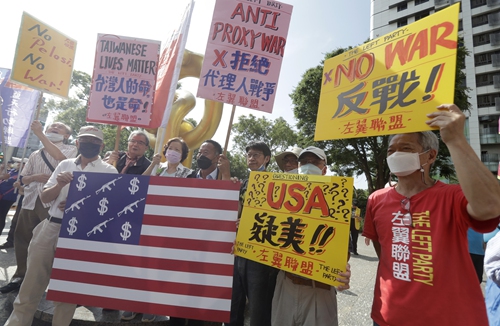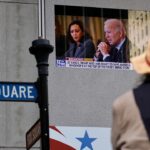It’s nothing new for some separatist media outlets on the island of Taiwan, backed or indulged by the Democratic Progressive Party (DPP) authorities, to fabricate fake news to slander the mainland. Nonetheless, the rumors generated by a few outlets have reached a laughably ridiculous high after secessionist Lai Ching-te took office in May.
In June, a separatist newspaper on the island of Taiwan triggered widespread anger for falsely claiming that a mainland media outlet was involved in the production of a political talk show made by a local television station. The Lai administration soon hyped this story, with some secessionist media outlets, politicians, opinion leaders, and “network water armies” commenting and forwarding online, seizing the chance to attack the Chinese central government and media of the Chinese mainland..
This was a typical case of DPP authorities using rumors to invert right and wrong, mislead public opinion, and launch “cognitive war” against the mainland, observers across Taiwan Straits commented.
They noted that in recent years, the ruling DPP has formed a complete chain of fabricating rumors to attack Beijing, which has caused widespread resentment and anger across the Straits.
Producing fake news is a long-standing habit of the DPP, said Yu Chih-pin, special assistant to the chairman of the New Party, a pro-reunification political party in the island of Taiwan.
“The DPP smears the mainland to draw in more separatists and elicit support from people on the island,” Yu told the Global Times. “Sadly, those people being incited will eventually be the victims of the DPP’s villainies of countering the mainland and seeking independence.”

Protesters hold posters in Taipei, the island of Taiwan during the so-called Taiwan-US Defense Industry Forum, on May 3, 2023. Photo: VCG
Obvious fake story
The Liberty Times, an infamous secessionist newspaper on the island of Taiwan, made a fool of itself in late June by fabricating an obvious fake story to slander Beijing.
In an article it published online on June 25, the newspaper wrote that a journalist from a Beijing-based official media outlet played a key role in editing the contents of a political talk show at one of the island’s TV stations.
Citing an anonymous source, the article claimed that an “unnamed broadcaster” on the island of Taiwan had “accepted editorial direction” from a correspondent from Beijing. It then cited the source as saying that the mainland government “had reached out to several TV stations” on the island of Taiwan, asking them to make political talk shows based on Beijing’s requirement. The mainland government offered “commercial interests in return,” said the article.
Superficially a “news story,” it is neither authentic nor credible, fully exposing the bias and unprofessionalism of some typical separatist Taiwan media outlets.
The story had no direct information about the names of the involved TV station and political talk show. Instead, it just cited anonymous sources, and maliciously used an AI-generated illustration for the article – an image of “a man with a five-starred red flag image on his back staring at people sitting in front of cameras.”
The uncorroborated story and offensive image was soon criticized within the island. The Liberty Times “treated Taiwan people like fools,” lambasted local newspaper China Times on June 26.
“Why did they not dare not to disclose the television station and political talk show? Evidently, the lie would be easily exposed with more ‘details,'” it said. “Also, blurred information enabled them to deliberately create a ‘smokescreen,’ causing the media outlets on the island, whether separatist or not, to feel threatened and be suspicious of each other.”
Why did the DPP and the media outlets it backs fabricate and hype such a ridiculous rumor in late June? Yu analyzed that, rumors like this were a “follow-up” of the DPP’s move to reduce the number of mainland journalists on the island of Taiwan earlier that month.
“The DPP cut the number by half, and did everything it could to prevent mainland journalists from reporting in Taiwan,” Yu told the Global Times. “Then there was the rumor that threw mud at the mainland media – an excuse for the DPP to rationalize its suppression of the mainland media here.”
In a response, the Taiwan Affairs Office of China’s State Council criticized the Liberty Times story as a purely fabricated piece of fake news. With extremely malicious intentions, DPP authorities used this story to smear and attack the mainland, deceiving and misleading the people on the island, said Zhu Fenglian, spokesperson of the office, at a regular press conference on June 26.
The DPP authorities are accustomed to instructing pro-separatist media and nurturing “network water armies” to engage in cognitive deception against the people on the island of Taiwan, dividing local society, and inciting hostility between the two sides of the Straits, Zhu said.
“We warn the DPP authorities to immediately cease their actions that harm the vital interests of the Taiwan compatriots and undermine the development of cross-Straits relations for their own political gain,” she noted.
Chain of fabricating rumors
The recent Liberty Times fake article, along with many other pieces of misinformation by local separatist media outlets have exposed a complete chain of rumor fabrication by the DPP in its cognitive warfare against the mainland.
Scholars in Taiwan and cross-Straits relations studies reached by the Global Times summarized some key links in the chain: Separatist media take the lead in stirring up a topic by fabricating fake news with “anonymous sources,” then the DPP authorities condemn the mainland according to the topic while putting aside the facts, followed by the secessionist opinion leaders continuing to hype the rumors with inflammatory remarks.
This disinformation campaign chain usually starts with an old trick of a media outlet producing a fake, eye-grabbing story.
For example, in early 2021, the Liberty Times claimed that Taiwan residents in the mainland were forced to take the mainland-produced COVID-19 vaccines, citing unnamed “people from both sides of the Straits.”
The rumor soon enraged many Taiwan residents, with many of them who had been vaccinated in the mainland soon either telling the media or sharing the truth about their voluntary vaccination experience online to refute the fake news.
“Making up such an illogical and counter-intuitive lie is an insult to the intelligence of Taiwan compatriots,” criticized the People’s Daily on January 18 that year. Rumors like this have fully exposed that separatist media like Liberty Times are far from professional, independent news agencies, but brainless disinformation machines that smear the mainland in cooperation with the DPP.
Inflammatory comments of secessionist opinion leaders help accelerate the spread of the rumors and inflame public sentiment in the disinformation chain. In May, the Taiwan Affairs Office announced sanctions against five politicians, media persons, and public figures, who have frequently slandered the mainland on TV programs, at press conferences, and on social media.
Among them Huang Shih-tsung, for instance, is a recidivist of attacking the mainland with ridiculous rumors. In 2019, Huang’s statement on a TV program that mainland residents were so poor that they “can’t afford preserved pickles” caused anger across the Straits. He has made up or spread many other absurd opinions to bad mouth the mainland, such as the reason why the mainland is the world’s largest car exporter is because “the mainland’s economy is so bad that it can’t afford to buy many cars, and has to export the cars instead.”
The DPP-backed “1450 online army” also plays an essential role in further spreading such rumors and provoking hatred toward Beijing. On the island of Taiwan, the “1450 online army” comes from the DPP’s plan to allocate NT$14.5 million ($441,279) in 2019 to employ a small number of editors to “correct” information on the internet. The practice was accused by local people of taking taxpayers’ money to support the online army to spread anti-Beijing rumors and “clarify” information deemed unfavorable to the DPP. The “army” was engaged in spreading offensive rumors against the mainland including labeling COVID-19 “the Wuhan virus.”
“This is just Lai’s tactic to control local society, suppress the opposition parties, and confront the mainland,” said Yu. “It is foreseeable that rumors like this will only increase in the near future.”
Spotty history
The DPP’s rumor-mongering chain has been operating for a long time in the island to influence the public’s voting intentions in elections, observers noted.
The underlying logic of this chain was exposed by the resignation of then Taiwan-leader Tsai Ing-wen’s classmate, then vice chairman of the “Transitional Justice Commission” Chang Tien-chin as early as in 2018, according to experts.
Chang was reported to have resigned over his alleged plan to manipulate public opinion against Kuomintang (KMT) New Taipei City mayoral candidate Hou You-yi, according to the Taipei Times.
It is an old trick of many DPP legislators to fabricate rumors, especially during local elections. Previous DPP Taoyuan city councilor Wang Hao-yu is a typical example and has been mocked as the “rumor-mongering councilor” by netizens.
In January 2019, Wang posted on Facebook, claiming that Taiwan’s Hsiung Feng III missile is the world’s most powerful anti-ship missile, capable of destroying a mainland aircraft carrier in just a few seconds. However, his boast was immediately refuted by Taiwan netizens: “Anyone who has served in the military knows Taiwan’s military capabilities; don’t have a false sense of security.”
In recent years, some so-called Taiwan celebrities have also fabricated false information that has earned them ridicule on both sides of the Straits, such as “the Chinese mainland people cannot afford tea eggs” and “mainland high-speed trains have no backrests.”
In response, Chen Binhua, a spokesperson for the State Council’s Taiwan Affairs Office, said at a press conference on May 15 that, for some time, a few so-called celebrities in Taiwan island have deliberately fabricated negative information about the mainland, disregarding the facts of mainland development and progress, and disseminated it widely through television, the internet, newspapers, and other media sources.
Their erroneous remarks have misled some people in Taiwan, stirred up hostility between the two sides, hurt the feelings of compatriots on both sides of the Straits, and the facts are clear and the situation is serious, Chen stressed.
The DPP has its own set of tricks to maintain its ruling position, which is to use the so-called “resist China, protect Taiwan” slogan as its demand, creating a crisis-ridden atmosphere that ultimately converges into the illusion that “to protect Taiwan, one must unite under the leadership of the DPP.”
However, such tricks only reveal the DPP’s lack of confidence in its “achievements” in the last eight years of governance. But the question is, how many times can the people be fooled by the same old tricks?
Yu said he felt sad for the people who are cheated by the DPP that they support. “They have had the opportunity to enjoy the benefits of the mainland’s development, but the opportunity has been cut off by the DPP,” he said. “While unaware of this, they have instead become trapped in a painful anti-mainland mindset.”













